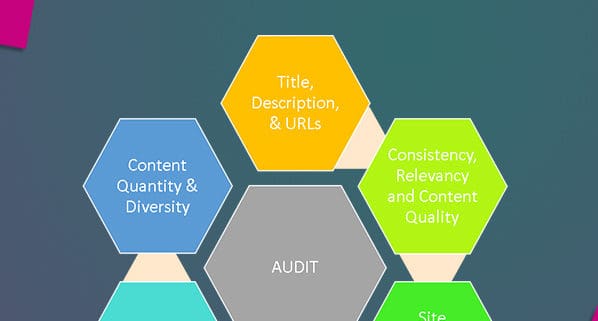The Easy SEO Guide: How to do a DIY basic site audit without using fancy tools
The Easy Audit: A guide to auditing your site SEO without tools or magic
Nobody likes an audit. Any kind of audit! And when it comes to an SEO audit, digital marketing specialists have a tendency to overcomplicate things.
The truth is, most of the big-ticket items impacting your SEO are things you can easily look into on your own to see where you stand and what you need to do to bring your site up to par. You do need to know your metadata from your messaging, but you don’t need to be a digital ninja/guru/magician.
Here are the 6 most important factors to look at in your basic SEO audit.
1. Page Titles, Descriptions, & URLs
I said it would be easy. I didn’t say it wouldn’t be a bit tedious! Yes, you need to look at these things for every page you are intending to audit.
The page titles, descriptions and URLs are what appear in Google, Bing or other search engine results pages.
Title
- Is it between 40 to 70 characters?
- Is it informative (Does it adequately describe what the business does or the content of that page)?
- Does it include the keywords you want to rank for?
Description
- Is it between 120-155 characters?
- Is it informative?
- Does it include the keywords you want to rank for?
- Does it intrigue the searcher to click on your search result?
URL
- Is it HTTPs? HTTPs is preferred over HTTP across the whole site.
- Is it informative?
- Are all characters lowercase?
- Are you using hyphens instead of underscores? Hyphens are preferable.
- Is it free of any unconventional characters?
- Are all URLs across the site free of inconsistent parameters?
2. Content Quality
Keywords are a start. But there’s more to quality SEO content than hitting the right keywords. Relevancy, consistency and value to the reader are all critical elements of good SEO content as well. When auditing your content, look for the following quality factors:
- Is there a consistent use of keywords across the site and in tags?
- Is there a good keyword density?
- Is there both dynamic and static content?
- Is the content relevant to the industry/product/service?
- Is the content share-worthy?
- Does the content drive value to the reader?
- Are you targeting a select number of keywords vs. keyword stuffing?
3. Content Quantity & Diversity
The amount of unique content on your site is also a factor.
- Is there a good amount of text on each page?
- Is there a good text to code ratio?
- Is there a diversity in which content is shown?
- Are you capitalizing on text, PDF, video, images, slides, etc?
4. Site Structure and Index-ability
We’re moving into a more technical territory, but everything here is fairly simple to look into without any fancy tools.
- Are the pages, posts, and properties mapped properly?
- Is there a clean and up-to-date sitemap?
- It there a proper interlinking approach implemented on site? (i.e. linking to other pages, and posts within your site.)
- Are you using your robots.txt file properly? The best way to check is to type www.yourdomain.com/robots.txt into your address bar. This file will show you if you are accidentally de-indexing your site.
- Is the site free of broken links? Broken links are a sign that your site may need technical optimization.
5. Page Speed and Functionality
- Does each page load quickly? To see if something is slowing down your site, try the Google Page Insight test.
- Is the site free of broken links?
- Is everything on the site loading properly? (images, videos, forms, menus, etc.)
- Is the site mobile friendly? To check, try Google’s Mobile Friendly test here: https://search.google.com/search-console/mobile-friendly
6. User Experience
Last, but not least, ensure your site is easy to use.
- Is the site easy to navigate?
- Is there proper internal linking?
- Is there a call to action and/or a clear message on the site?
- Can visitors easily and quickly understand what your business is about?
- Do you have the most important elements on your site above the fold?
Takeaway:
You don’t necessarily need a specialist or a set of pro-tools to audit your site. All you need is some attention to detail, a little time and to know where to look. The time you invest in your audit and any optimizations based on your findings will pay off, big time. If you are intending to take things to the next level, then consider hiring an SEO expert.
If you are looking for more advice on how to audit your site feel free to reach out :)
Email: t@rimanagency.com







![The Un-obsolete SEO Guide for Entrepreneurs and Businesses [Infographic]](https://rimanagency.com/wp-content/uploads/2018/04/seo-header11-80x80.jpg)
Leave a Reply
Want to join the discussion?Feel free to contribute!